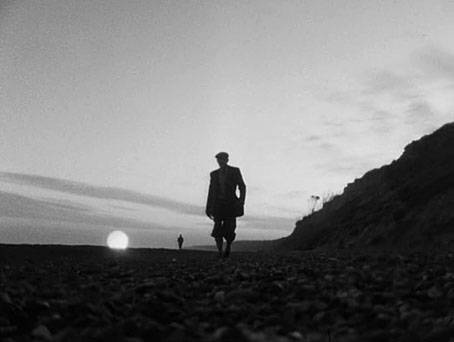
Whistle and I’ll Come to You (1968).
He blew tentatively and stopped suddenly, startled and yet pleased at the note he had elicited. It had a quality of infinite distance in it, and, soft as it was, he somehow felt it must be audible for miles round. It was a sound, too, that seemed to have the power (which many scents possess) of forming pictures in the brain. He saw quite clearly for a moment a vision of a wide, dark expanse at night, with a fresh wind blowing, and in the midst a lonely figure—how employed, he could not tell. Perhaps he would have seen more had not the picture been broken by the sudden surge of a gust of wind against his casement, so sudden that it made him look up, just in time to see the white glint of a sea-bird’s wing somewhere outside the dark panes.
MR James, Oh, Whistle, and I’ll Come to You, My Lad.
One of the alleged highlights of this year’s Christmas television from the BBC was a new adaptation of an MR James ghost story, Oh, Whistle, and I’ll Come to You, My Lad. The film starred John Hurt and came with the same truncated title, Whistle and I’ll Come to You, as was used for Jonathan Miller’s 1968 version, also a BBC production. The story title comes originally from a poem by Robert Burns. The new work was adapted by Neil Cross and directed by Andy de Emmony, and I describe it as an alleged highlight since I wasn’t impressed at all by the drama, the most recent attempt by the BBC to continue a generally creditable tradition of screening ghost stories at Christmas. Before I deal with my disgruntlement I’ll take the opportunity to point the way to some earlier derivations. (And if you don’t want the story spoiled, away and read it first.)
Illustration by James McBryde (1904).
James’s story was published in 1904 along with seven others in Ghost Stories of an Antiquary, the first of four supernatural collections which were adjuncts to the author’s theological researches but are now the works for which the name MR James is most widely recognised. A first edition can be found at the Internet Archive which is worth seeing for its illustrations by James McBryde, a friend of James who died before he had a chance to finish illustrating the book. He did manage to complete the two drawings for Whistle shown here and it’s a shame the scanned edition is another poor job by Google who haven’t copied the pages in high-resolution and manage to blur the linework. McBryde’s second drawing has also been used as a cover illustration for various editions.
Illustration by James McBryde (1904).
Illustration by Ernest Wallcousins (1947).
The 1947 edition of The Collected Ghost Stories of MR James features a frontispiece by Ernest Wallcousins depicting the moment when Whistle‘s unfortunate Professor Parkins is nearly pushed out of his bedroom window by the vengeful ghost. Both McBryde and Wallcousins yield to the temptation of showing us the climax of the story and the ghost itself, something which is arguably a bad idea for this kind of tale. In Wallcousins’ case the nebulous spirit has gained a distinctly brawny arm. Ghosts and monsters may share some qualities but ghosts in the James manner exist for the most part as intimations whose presence the reader’s imagination brings to life. Forcing these intimations into a solid representation does them few favours, a problem which also bedevils film and television adaptions.
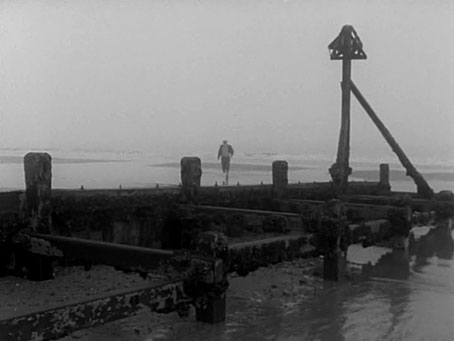
Whistle and I’ll Come to You (1968).
Jonathan Miller’s version of the story dealt superbly with this issue, managing to hint at much and show little except for a couple of crucial moments. Miller aged the character of Parkins (Michael Hordern) with no detriment to the story, and with a recurrence of reflected images suggested that the presence summoned by the blowing of an ancient whistle might be a spectre from Parkins’ imagination. It’s amusing to read now of James purists being upset by these minor changes, the maulings sustained by the most recent version must have ruptured blood vessels. Miller’s film is an excellent example of how to adapt a short story for the screen.
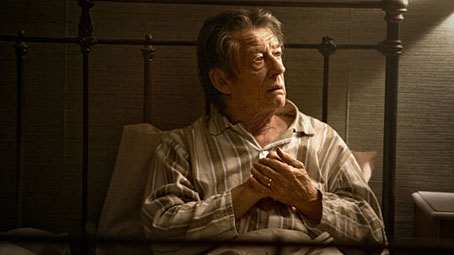
Whistle and I’ll Come to You (2010).
Had Miller’s version remained unseen since 1968 there might have been a reason to make a new adaptation of the story but it’s not a buried treasure by any means; the BBC have shown it several times since, the BFI released it on DVD in 2001 and the film is very familiar to all aficionados of these ghost films. More damaging than the attempt to compete with Miller’s version was the ruinous altering of the narrative and a mise en scène which showed little grasp of what makes an MR James story effective.
Neil Cross’s adaptation updated James to the present day, a manoeuvre that might have worked if it wasn’t for a clumsy attempt to explain why Hurt’s character wouldn’t summon help with his mobile phone. Clumsier still was the tone of the whole thing which seemed ghostly from the outset, with its semi-catatonic characters and gloomy, vapour-filled interiors. John Hurt’s retired scholar was given an absent wife and discovered a ring instead of the Templar’s whistle, a detail which made nonsense of the story’s title and also lost the motor of the story. In place of the escalating horror of Miller’s dream sequence there was a confusion of unrelated images. This kind of mangling has never made sense to me, it implies a lack of faith in the original material which the producers have nevertheless committed themselves to adapting. “We can’t work convincingly with this hokum,” it seems to say, “but we’ll do something with it anyway.” The film’s biggest shocks—someone or something hammering on a hotel door at night—were not only further impositions on the original tale but were plundered wholesale from one of the greatest of all ghost films, Robert Wise’s The Haunting. Neil Cross might have benefited from reading James’s own ghost story recipe:
Let us, then, be introduced to the actors in a placid way; let us see them going about their ordinary business, undisturbed by forebodings, pleased with their surroundings; and into this calm environment let the ominous thing put out its head, unobtrusively at first, and then more insistently, until it holds the stage. (more)
From the introduction to Ghosts and Marvels (1924).
MR James published twenty-six ghost stories during his lifetime, only a handful of which have been adapted for film or television. In choosing to rework something which already exists in a superior version the BBC show themselves adept at least in competing with the worst tendencies of Hollywood, where producers and directors see something they like from the past and believe for whatever reason that it can be refreshed or even improved upon. For UK viewers the new Whistle will be screened again late tonight on BBC 1. Anyone who finds themselves unsatisfied by this is encouraged to search out some of the earlier adaptations (see below). Future adaptors, meanwhile, might try creating something new instead of messing with things better left undisturbed.
Recommended viewing:
• Whistle and I’ll Come to You by MR James (1968)
• The Stalls of Barchester by MR James (1971)
• A Warning to the Curious by MR James (1972)
• The Stone Tape by Nigel Kneale (1972)
• Lost Hearts by MR James (1973)
• The Treasure of Abbot Thomas by MR James (1974)
• The Ash Tree by MR James (1975)
• The Signal-Man by Charles Dickens (1976)
• Casting the Runes by MR James (1979)
• Schalcken the Painter by J. Sheridan Le Fanu (1979)
Further information:
• Ghosts and Scholars, home of the MR James Newsletter
Elsewhere on { feuilleton }
• The illustrators archive
Previously on { feuilleton }
• Penda’s Fen by David Rudkin
• Kwaidan
• The Watcher and Other Weird Stories by J Sheridan Le Fanu
• Alice in Wonderland by Jonathan Miller
• The Willows by Algernon Blackwood


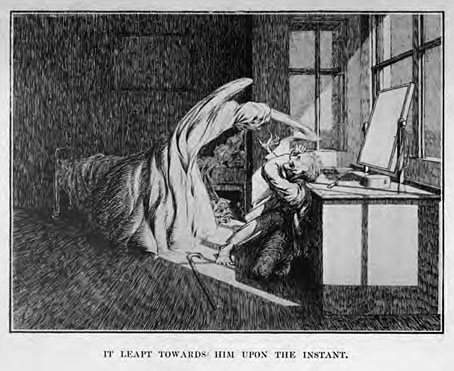
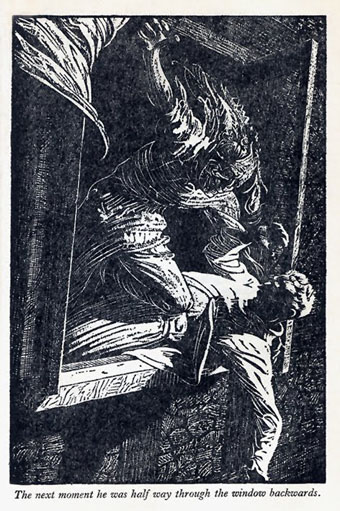
The remake of the Haunting was really terrible
http://en.wikipedia.org/wiki/The_Haunting_(1999_film)
“As a result of the negative reviews, it was nominated for five Razzie Awards. However, the film was a financial success, earning $91.2 million domestically and $177.3 million worldwide, with a budget of $80 million”
how can rubbish like this make a profit.
I admire the original so much I avoided it on principle, a glance at the trailer was enough.
I also avoided it on the strength of the trailer, which apart from anything else suggested that the ghost was portrayed by a man with a sheet over his head. I ended up watching the Michael Hordern version – still remarkably frightening even on youtube. I can’t see why they decided to remake it, rather than one of James’ other stories; I would love to see a version of Mr Humphrie’s Inheritance.
The most recent BBC attempts to revive the Christmas ghost story have been a bit hit and miss, I think. The dramatization of A View From A Hill worked pretty well, but the version of Number 13 suffered from the same lack of faith in the original story that the remake of Whistle seems to have suffered from
Hi Alyxl. Yes, I enjoyed A View from a Hill as well and it seemed to bode well that the BBC was managing to continue the tradition without getting silly or acting as though they know better than the author. I’m not a stickler for absolute fidelity when it comes to adaptations but when you change a story so much that it breaks you defeat the purpose of the exercise.
John, I agree with you! In addition, there is no way such a gloomy hotel would have passed the British Tourist Board’s exacting standards. I also assume that it was a BBC requirement to include women in the main frame of the drama whereas James’ stories are normally only about crusty old antiquarians; women don’t normally feature in his stories to any great A total disaster! I would have much preferred to have seen a reshowing of “Schalken the Painter” or “The Gourmet”. Would have cost the BBC less too.
Chaz: In my less charitable moments I’d suspect the same regarding the lack of female roles. If this was the case the sensible thing to do would be to abandon James (and Lovecraft and the rest) to the chauvinistic past and make something else.
Thanks for the reminder of The Gourmet, a film I haven’t seen for years. Used to have it on tape but it went astray. I always relished the use of one of the Hawksmoor churches and the way Charles Gray delivered the line “Not of this earth?!”
As for Schalcken, I have rather a fetish for the productions of director Leslie Megahey, also the director of other short dramas in the Omnibus strand, some great Arena interviews with Orson Welles and György Ligeti, and a film of Bartók’s Bluebeard’s Castle which I referred to recently.
Why did the BBC say this was based on the M.R. James story?
In fact, from what I remember of the title credits, M R James was not even mentioned. I don’t understand why Neil Cross didn’t make a few more changes and call this a completely new story. It differed enough from the 1968 version, which itself is different from the original story, to be far from an ‘adaptation’ of the story; to call it such is a travesty.
The BBC should be ashamed that they used James’s reputation to sell it but at the same time called it a ‘thoroughly modern re-working’ of the tale.
I love the tradition of the BBC showing a ghost story for Christmas but this was a real cheat, not a treat!
It was truly diabolical (as Dr. Terrible might have said) wasn’t it? The single touch that I liked was the off-putting white bust on the hotel room shelf. Other than that it was a butchering of the original; nothing to do with MR James at all really. As you say, it was a big let-down considering the previous two offerings, both of which I thought were excellent. I guess there’s just a huge cultural divide between BBC3 and BBC1. I shall be digging out my copy of Schalcken for new year’s night and try to forget all about it. BTW, I’d never heard of The Gourmet, so thanks for that!
PS, AlyxL: There’s an interesting 1976 version of Mr Humphries & His Inheritance available here: http://www.amazon.co.uk/Casting-Runes-DVD-Edward-Petherbridge/dp/B000TP4FT8/ref=sr_1_1?ie=UTF8&qid=1293807177&sr=1-1
It’s an adaptation for a schools & Colleges course about writing music for drama, but whilst truncated from the book I still find it enjoyably creepy. The ‘main feature’ is a 1978 version of Casting The Runes which IMHO succeeds admirably in updating the story to then-contemporary England.
You’re right, I’ve added Casting the Runes to the list above. It was a production for ITV but the director was Lawrence Gordon Clark who was responsible for the first run of BBC ghost stories so it’s part of the canon, as it were. Also an effective updating of the story if you overlook the use of video for interiors, something which blighted all UK TV in the 1970s. I’m very partial to Night of the Demon but Iain Cuthbertson made a great Karswell.
The Lawrence Gordon Clark adaptation was very good but marred – as you stated – by the wobbly video work which also marred the effectiveness of “The Stone Tape”. The Gordon Clark version ended on a particularly callous note when the demon came for Karswell on a passenger plane leading to a total loss of life of all those on board whereas, as in the story and the filmi, the horror is perpetrated on Karswell alone. Have spent many a happy hour trying to envisage the enormity of that horror!
I have,somehere, a VHS tape with “Schalken..”, “The Gourmet”, “Kitchen Sink” and a Polish version of Sologub’s “The Worm”; if I was a true capitalist, I would put them all on a dodgy DVD and sell copies on ebay – make a fortune!
Absolutely agree with this, and it’s very interesting to see the original illustrations, which I had no idea existed.
Not only did the BBC badly rework the story, but they badly reworked what remains 40 years later, a study in the art of adaptation.
I also felt it was all rather intellectually unsatisfying, and I attempted to explain why in my own blog post, if you’re interested, it can be read at: http://compulsorymeatraffle.tumblr.com/post/2499133640/on-m-r-james-and-history
Chaz: I expect that was for economy as much as anything. You could restage the end of the story on an airport runway but would no doubt need a feature film budget to make it effective.
Hi Tristan. James McBryde also did a couple of illustrations for Canon Alberich’s Scrap-Book. As for the BBC’s recent effort I agree that it looked like a glib attempt to provide an explanation. At the heart of James’s story is that question—“Who is this who is coming?”—to which we never find the answer. James was very keen on Sheridan Le Fanu’s tales and one of Le Fanu’s most shocking stories, Green Tea, concerns an inexplicable haunting whose apparently random and meaningless nature only increases the horror. But lack of explanation offends the doctrinaire producer’s mind. It may have been that syndrome at work or it may have been a belief that a fusty narrative could be improved upon. Truman Capote’s script for The Innocents showed you can throw fresh light on old stories but you still need to be sympathetic to the original material, without that you’re sunk.
I actually didn’t mind the version with John Hurt as much as I thought I might, granted it was flawed and veered far from the original tale, but I liked that in its ‘modernisation’ it didn’t go all ‘fast action’ as is often the case and retained a laconic nervy pace.Basically I suppose I was pleased that it wasn’t much worse as it easily could have been .
I agree regarding the current irritating tendency for re-makes. Fair enough the odd remake, but now it’s like the industry that calls the shots daren’t take a chance on anything new.
I love the McBryde illustrations. Alas my M R James book isn’t illustrated, but I’ll look out for a copy of that edition.
Some of you might like this:
http://www.bbc.co.uk/programmes/b008jvjz (the synopsis is on the BBC website, the radio play is available on a few torrent sites.)
A Warning to the Furious – which in my opinion is a respectful way to treat M R James!
Dear John,
What a relief to read these dissenting opinions. Whistle was one of the few new pieces of drama on over Christmas and what a shambles it was. However, there were some terrific ghost stories on over Christmas, on BBC7, including Lawrence Jackson’s new adaptations of five De La Mare tales and a repeat of his superb adaptation of Schalken The Painter. They might still be up on the BBC7 website…
Hi Andrew, thanks for the tip. De La Mare deserves the attention, I’ve been recommending his stories for years.
Fully agree, naturally. For me in any James story the plot is firmly in service to the atmosphere. So to abandon the atmosphere but (barely) retain the plot misses the point with spectacular aplomb. The great BBC James adaptations know this, and any reading of the original allied with a grain of common sense would suggest it.
If I was charitably inclined I might suggest that removing the whistle from the story nudges the new adaptation into the realm of extremely subtle satire.
As an ardent James fan of over 40 years, I agree a remake was probably not the best idea. I am still waiting for someone to do justice to A School Story and The Mezzotint. Hopefully without straying from the plotlines. Also, a decent interpretation of Casting the Runes is well overdue.
“Whistle” was made also in 1962 into a radio drama, starring (again) Michael Horden. I’ve a MP3 copy of it, and I’m strangely compelled to listen to it every time I have to drive at night in the mountains. Great stuff!
“Stone Tape” is/was beautiful. Saw it for the first time three years ago, and I thank god I never saw it as a child – I would have died.